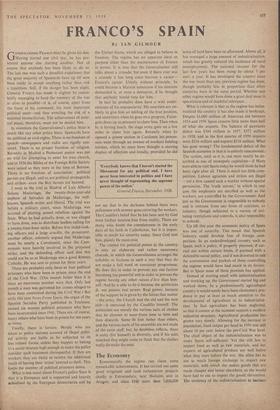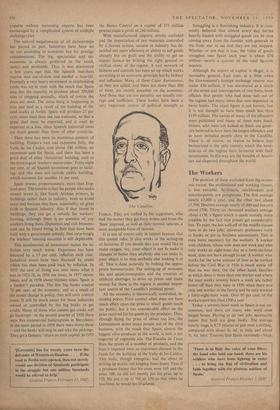The Economy
Economically the regime can claim some remarkable achievements. It has carried out some good irrigation and land reclamation projects chiefly in Estremadura, near Badajoz, and in Aragon, and since 1940 more than 3,000,000 acres of land have been re-afforested. Above all, it has managed a large amount of industrialisation, which has greatly reduced the incidence of rural unemployment. The national income for the last few years has been rising by about 5 per cent. a year. It has developed the country since the war more than any previous regime has done, though probably less in proportion than other countries have in the same period. Whether any other regime would have done a great deal more is speculation and of doubtful relevance.
What is relevant is that as the regime has indus- trialised the country it has also made it bankrupt. Despite $1,000 million of American aid between 1954 and 1959 Spain exports little more than half of what she imports. The balance of payments deficit was $394 million in 1957, $372 million in 1958, and in the first quarter of 1959 imports were $216 million and exports $116 million. What has gone wrong? The fundamental defect of the Spanish economy is that it is entirely uneconomic. The system, such as it is, can most nearly be de- scribed as one of monopoly capitalism—if Marx were able to visit Spain today he would think he had been right after all. There is much too little com- petition. Labour agitation and strikes are illegal —yet a firm cannot sack a worker without special permission. The 'trade unions,' in which in any case the employers are enrolled as well as the workers, are controlled by the Government. And just as the Government is responsible to nobody and is immune from any form of criticism, so industry, though subjected to a variety of irri- tating restrictions and controls, is also responsible to nobody.
Up till this year the economic policy of Spain was one of autarchy. This meant that Spanish 'industry, could develop free of foreign com- petition, In an underdeveloped country such as Spain, such a policy, if properly planned, if car- ried out within certain limits, if pursued with a defensible social policy, and if not distorted to suit the convenience and pockets of those controlling the regime; would have had much in its favour. But in Spain none of these provisos has applied.
Instead of starting small with industrialisation and working up, the Government started big and worked down. In a predominantly agricultural country it would surely have been elementary pru- dence to pay at least as much attention to the development of agriculture as to industrialisa- tion. In fact agriculture has been neglected, so that it cannot at the moment support a modern industrial structure. Agricultural production has grown very slowly. Allowing for the increase in population, food output per head in 1956 was still about 10 per cent, below the pre-Civil War level. The chief object of the industrialisation was to make Spain self-sufficient. Yet she still has to import food as well as raw materials, and her exports of agricultural produce are well below what they were before the war. She often has to use as much foreign exchange to import raw materials, with which she makes goods that are made cheaper and better elsewhere, as she would have had to use to import the goods themselves. The tendency of the industrialisation to increase
imports without increasing exports has been encouraged by a complicated system of multiple exchange rates.
The natural megalomania of all dictatorships has played its part. Industries have been set up not accOrding to economic but for prestige considerations. The big, spectacular and un- economic is always preferred to the small, useful and profitable. Thus it was discovered a few years ago that the Spanish Merchant marine was out-of-date and needed a face-lift. Promptly a very heavy investment in shipbuilding yards was set in train with the result that Spain now has the capacity to produce about 350,000 tons of shipping annually, which of course she does not need. The same thing is happening in iron and steel as a result of the building of the steel works at Avil6s. Spain will produce 25 per cent. more steel than she can consume, so that a great deal must be exported, and it must be exported at a loss, since Spanish industrial costs are much greater than those of other countries.
Then there has been an enormous amount of building. Franco's vast and expensive folly, the Valle dc los Caidos, cost about £40 million, an enormous sum for Spain, and there has been a great deal of other 'dictatorial' building, such as the extravagant 'workers' universities.' Forty-eight per cent. of all Spanish investment goes in build- ing, and this does not include public building, which accounts for another 13 per cent.
Spain invests, proportionately, more than Eng- land does. The trouble is that the people who make money invest it, like Saudi Arabian princes, in buildings rather than in industry, both to avoid taxes and because they have, reasonably, no great faith in Spanish industry. Also if they invest in buildings, they can get a subsidy for workers' housing, although there is no question of any workers living there. Diplomats and rich business- men can be found living in flats that have been built with a government subsidy. Not surprisingly the workers' housing situation is still deplorable.
This misdirection of investment makes the in- flation very much worse. Expansion has been financed by a 15 per cent. inflation each year. Industrial losses have been financed by credit which has then been paid back by inflation. In 1955 the cost of living was nine times what it was in 1922-26, in 1956 ten times, in 1957 eleven times, and in 1958 about thirteen times. Spain is a banker's paradise. The five big banks control 70 per cent, of the economy, and as a result of the recent change in policy, they will soon control more. It will be much easier for those industries owned or controlled by the big banks to get credit. Many of those who cannot get credit will go bankrupt—in the second quarter of 1958 there were five commercial bankruptcies in Barcelona; in the same period in 1959 there were thirty-three —and the banks will step in and take the pickings. They get a fantastic return on their capital. In 1957 1Gennany] has for twenty years been the defender of Western civilisation. . . . If the road to Berlin were opened, then not merely would one division of Spaniards participate in the struggle but one million Spaniards would be offered to help.'
General Franco, February 15, 1942. the Banco Central on a capital of 375 million pesetas made a profit of 244 million.
With manufactured imports strictly excluded and the importation of raw materials controlled by a licence system, success in industry has de- pended not upon efficiency or ability to sell goods cheaply but on graft and the ability to get an import licence by bribing the right general or civilian crony of the regime. A vast network of licences and controls has been set up which works according to no economic principle but by bribery and influence. Many of these Colas Aukinornas, as they are called, and there are more than 800 of them, are merely parasites on the economy. And those that are not parasitic are usually cor- rupt and inefficient. These bodies have been a very important source of political strength to
• The C'amlillo.
Franco. They are staffed by his supporters, who find the money they get from bribes and from the 'fines' imposed, as well as their normal salaries, a most acceptable form of income.
It is not of course only in import licences that this system rules. It also works in the setting-up of factories. If you decide that you would like to make oxygen, say, your object is not fo make it cheaper or better than anybody else can make it; your object is to stop anybody else making it at all. This is done naturally by bribing the appro- priate bureaucracies. The setting-up of monopo- lies and quasi-monopolies and the creation of artificial shortages to drive up prices and make money for those in the regime is another impor- tant source of the Caudillo's political power. • All the economy is theoretically controlled, in- cluding prices. Price control often dcies not have much effect upon the price at which goods reach the public, but it has considerable effect on the price received for his goods by the producer. Thus, through fixing the price of olives too low, the Government drove many people out of the olive business, with the result that Spain, almost the biggest olive-producer in the world, is now a net importer of vegetable oils. The Tiscalfa de Tasas fixes the prices of a number of products, and the fines it imposed were an important element in the funds for the building of the Valle de los Carclos. This body, though energetic, had the effect of driving tip prices, not keeping them down. Thus if a producer found that his costs were 105 and the price 100, he did not merely put his price up to 120. He put it up to 160 or 170 so that when he was fined, he would not be a loser. Smuggling is a flourishing industry. It is com- monly believed that almost every day lorries heavily loaded with smuggled goods can be seen coming away from the frontier with generals in the front seat to see that they are not stopped. Whether or not that is true, the value of goods smuggled into Spain each year is about £70 million—nearly a quarter of the total Spanish imports.
Although the export of capital is illegal, it is inevitably general. Last year, at a time when the Government's foreign exchange reserve was under £30 million, it was discovered as a result of the arrest and interrogation of two Swiss bank officials that people who had done well out of the regime had many times that sum deposited in Swiss banks. The exact figure is not known, but it is not thought to have been much less than £150 million. The names of many of the offenders were published and many of them were fined. Others, who were not named or fined, are gener- ally believed to have been the largest offenders and to have included people close to the Caudillo. There is, of course, no reason to believe that Switzerland is the only country which the bene- ficiaries of the regime have favoured with their investments. In this way are the benefits of Ameri- can aid dispersed throughout the ■, orld.











































 Previous page
Previous page